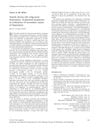 January 2023 in “International journal of dermatology, venereology and leprosy sciences”
January 2023 in “International journal of dermatology, venereology and leprosy sciences” People with alopecia areata have different blood markers that suggest inflammation and immune system issues compared to healthy individuals.
 November 2022 in “Journal of the Endocrine Society”
November 2022 in “Journal of the Endocrine Society” Excessive iodine from a cystic fibrosis supplement can cause hypothyroidism.
 October 2022 in “Journal of advanced research in medicine”
October 2022 in “Journal of advanced research in medicine” A woman with Sheehan syndrome improved with hormone treatment.
 September 2022 in “Journal of Case Reports and Medical History”
September 2022 in “Journal of Case Reports and Medical History” Many new moms lose hair after childbirth due to hormonal changes, but it usually grows back within a year.

Hair loss can be caused by hormones, illness, autoimmune disorders, or vitamin deficiencies, and treatments vary depending on the type.
 January 2022 in “Journal of family medicine”
January 2022 in “Journal of family medicine” Polycystic Ovarian Syndrome (PCOS) can cause chronic inflammation, mental health issues, and changes in gut bacteria, but a holistic lifestyle change can significantly improve these conditions.
 January 2022 in “Medical research archives”
January 2022 in “Medical research archives” Taking vitamin D might improve life for MS patients and reduce skin side effects from alemtuzumab treatment.
January 2022 in “Clinical Cases in Dermatology” Hypothyroidism can cause hair loss, which is often reversible with treatment.
July 2021 in “Veterinary record/The veterinary record” A calf in Scotland likely had Schmallenberg virus from its mother.
March 2021 in “World rabbit science” Adding 0.2% taurine to Angora rabbits' diet improves wool production and overall health.
 March 2021 in “CRC Press eBooks”
March 2021 in “CRC Press eBooks” Physical exams are important in hair loss diagnosis, considering cosmetic history, systemic diseases, and classifying alopecia types.
 December 2020 in “Journal of Drugs in Dermatology”
December 2020 in “Journal of Drugs in Dermatology” The document concludes that more research is needed to confirm if blood tests for things like iron and vitamin D are helpful for hair loss from Telogen effluvium.
September 2020 in “Research Square (Research Square)” Goat skin adapts to seasonal changes through genes that respond to daylight length, affecting hormone levels and potentially making skin cells light-sensitive.
 September 2020 in “University of Thi-Qar Journal of Medicine”
September 2020 in “University of Thi-Qar Journal of Medicine” Low iron and vitamin D3 levels might be major causes of hair loss in Iraqi women.
 August 2020 in “Journal of The American Academy of Dermatology”
August 2020 in “Journal of The American Academy of Dermatology” Oral minoxidil can improve hair thickness and a comprehensive treatment approach leads to better alopecia outcomes.
 April 2020 in “IP Indian journal of clinical and experimental dermatology”
April 2020 in “IP Indian journal of clinical and experimental dermatology” Many children with alopecia areata also have other autoimmune diseases.
 January 2020 in “Medpulse International Journal of General Medicine/Medpulse International Journal of Medicine”
January 2020 in “Medpulse International Journal of General Medicine/Medpulse International Journal of Medicine” Premature graying of hair is often linked with other health issues, but treatment with biotin, zinc, and calcium pantothenate is not very effective.
January 2020 in “International Research Journal of Ayurveda & Yoga” Stress may contribute to the development of hypothyroidism, and both modern and Ayurvedic treatments can manage the condition.
September 2019 in “The journal of investigative dermatology/Journal of investigative dermatology” A new mutation in the STING protein causes a disease with lupus-like symptoms and responds well to a specific inhibitor treatment.

Baldness is often hereditary and linked to male hormones, becoming noticeable when half the hair is lost.
 January 2018 in “bioRxiv (Cold Spring Harbor Laboratory)”
January 2018 in “bioRxiv (Cold Spring Harbor Laboratory)” Researchers found key regions in the mouse hairless gene that control its activity in skin and brain cells, affecting hair follicle function.
 May 2017 in “Journal of the American Academy of Dermatology”
May 2017 in “Journal of the American Academy of Dermatology” Graves' disease can cause hair loss in children and should be considered when treating pediatric alopecia areata.

The document recommends a multidisciplinary approach and experience sharing to advance facial feminization surgery as a medical field.
 April 2016 in “Journal of The American Academy of Dermatology”
April 2016 in “Journal of The American Academy of Dermatology” People with Down syndrome are more likely to experience hair loss, and using dermoscopy can help diagnose it.
 January 2016 in “Springer eBooks”
January 2016 in “Springer eBooks” Alopecia Areata is an unpredictable autoimmune hair loss condition with limited and variable treatment effectiveness.
 December 2013 in “대한피부과학회지”
December 2013 in “대한피부과학회지” Korean women with female pattern hair loss have higher levels of ferritin, testosterone, and vitamin D than average.
 February 2013 in “Archives of Disease in Childhood: Education & Practice”
February 2013 in “Archives of Disease in Childhood: Education & Practice” Different types of alopecia in children require specific diagnoses and treatments.
 January 2013 in “Psychiatry and clinical neurosciences”
January 2013 in “Psychiatry and clinical neurosciences” Physical symptoms in depression can reveal underlying medical conditions.
 October 2011 in “Dermato-endocrinology”
October 2011 in “Dermato-endocrinology” Hormones significantly affect skin health, with vitamin D playing a key role.
 October 2011 in “Reactions Weekly”
October 2011 in “Reactions Weekly” A man had a severe allergic reaction to sulfasalazine, with symptoms improving after treatment and follow-up.
























